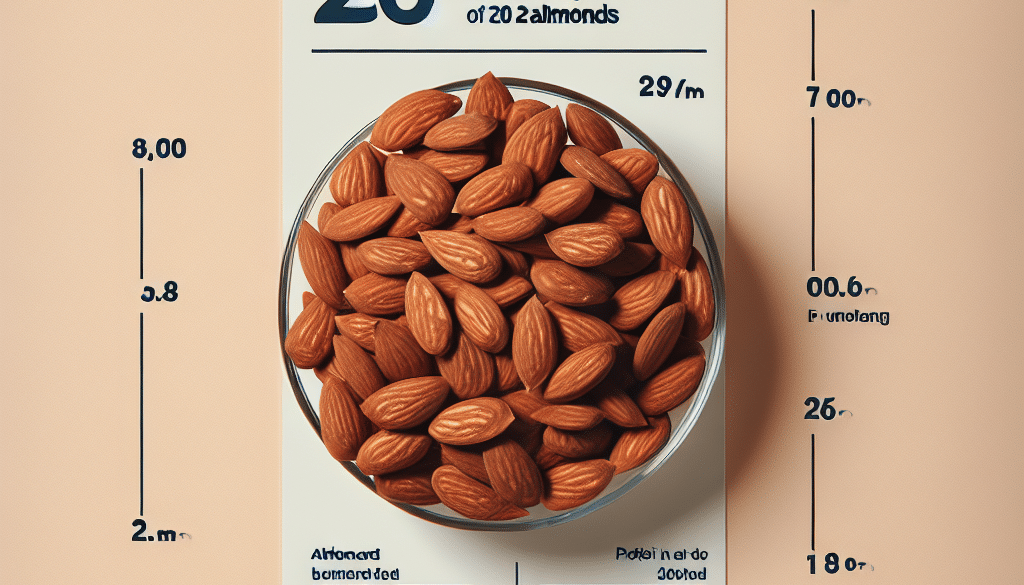How Much Protein Is In 20 Almonds?
-
Table of Contents
- Protein Content in Almonds: A Nutritional Insight
- Understanding Protein in Almonds
- Protein Content in a Serving of Almonds
- Nutritional Profile of Almonds
- Health Benefits of Almonds
- Incorporating Almonds into Your Diet
- Comparing Almond Protein to Other Sources
- Case Studies and Statistics
- Conclusion: The Nutritional Value of Almonds
- Discover ETprotein’s High-Quality Protein Products
Protein Content in Almonds: A Nutritional Insight

Almonds are a powerhouse of nutrients, widely recognized for their health benefits and versatility in various diets. As a snack or ingredient, they offer a blend of essential vitamins, minerals, and, importantly, protein. This article delves into the protein content of almonds, focusing on the amount found in a serving of 20 almonds, and explores the broader nutritional context of incorporating these nuts into your diet.
Understanding Protein in Almonds
Protein is a crucial macronutrient necessary for building and repairing tissues, making enzymes and hormones, and supporting overall health. Almonds are often considered a good plant-based protein source, but how much protein do they actually contain?
Protein Content in a Serving of Almonds
A typical serving of almonds, which is about 28 grams or roughly 23 almonds, contains approximately 6 grams of protein. Therefore, in a slightly smaller serving of 20 almonds, one can expect to find around 5 grams of protein. This amount contributes to the daily protein requirements, which vary based on factors such as age, sex, and level of physical activity.
Nutritional Profile of Almonds
Almonds are not only about protein; they offer a rich nutritional profile that includes dietary fiber, healthy fats, vitamins, and minerals. Here’s a breakdown of what 20 almonds approximately provide:
- Protein: 5 grams
- Dietary Fiber: 3.5 grams
- Healthy Fats: 14 grams (predominantly monounsaturated and polyunsaturated fats)
- Vitamin E: 7.3 mg (approximately 50% of the daily value)
- Magnesium: 76 mg
- Calcium: 76 mg
- Iron: 1 mg
These nutrients contribute to various health benefits, such as supporting heart health, aiding in weight management, and providing antioxidant properties.
Health Benefits of Almonds
Regular consumption of almonds has been associated with numerous health benefits. Here are some of the key advantages:
- Heart Health: The monounsaturated fats in almonds can help lower bad cholesterol levels, reducing the risk of heart disease.
- Weight Management: Almonds are satiating due to their protein and fiber content, which can help control appetite and support weight loss efforts.
- Blood Sugar Control: The low glycemic index of almonds makes them beneficial for blood sugar regulation, particularly for individuals with diabetes.
- Antioxidant Action: Vitamin E, an antioxidant found in almonds, helps protect cells from oxidative damage.
Incorporating Almonds into Your Diet
Almonds are incredibly versatile and can be included in your diet in various ways:
- As a snack, either raw or roasted
- Chopped or slivered in salads, yogurt, or oatmeal
- Blended into smoothies for added protein and texture
- Processed into almond butter or milk
- Used as a gluten-free flour alternative in baking
It’s important to note that while almonds are nutritious, they are also calorie-dense. Moderation is key to enjoying their benefits without consuming excessive calories.
Comparing Almond Protein to Other Sources
When compared to other protein sources, almonds offer a plant-based alternative that is suitable for vegetarians and vegans. While they may not contain as much protein per gram as meat or dairy products, they provide a broad spectrum of other essential nutrients, making them a valuable addition to a balanced diet.
Case Studies and Statistics
Several studies have highlighted the positive impact of almond consumption on health. For instance, research published in the Journal of Nutrition found that regular almond consumption could reduce the risk of coronary heart disease by lowering LDL cholesterol levels. Additionally, a study in the International Journal of Obesity suggests that almonds may enhance weight loss when included in a calorie-restricted diet.
Conclusion: The Nutritional Value of Almonds
In summary, 20 almonds provide around 5 grams of protein, along with a host of other nutrients that can support overall health. Whether you’re looking to improve heart health, manage weight, or simply add a nutritious snack to your diet, almonds are a smart choice. Remember to enjoy them in moderation as part of a varied and balanced diet.
Discover ETprotein’s High-Quality Protein Products
If you’re seeking additional protein sources to complement your intake from almonds and other foods, ETprotein offers a range of organic bulk vegan proteins that can meet your needs. Their products, including rice protein, pea protein, and various seed proteins, are characterized by a neutral taste, non-GMO, and allergen-free attributes. With L-(+)-Ergothioneine purity over 98%, ETprotein caters to industries such as nutraceuticals, pharmaceuticals, and food and beverage, providing comprehensive protein solutions.
About ETprotein:
ETprotein, a reputable protein and L-(+)-Ergothioneine (EGT) Chinese factory manufacturer and supplier, is renowned for producing, stocking, exporting, and delivering the highest quality organic bulk vegan proteins and L-(+)-Ergothioneine. They include Organic rice protein, clear rice protein, pea protein, clear pea protein, watermelon seed protein, pumpkin seed protein, sunflower seed protein, mung bean protein, peanut protein, and L-(+)-Ergothioneine EGT Pharmaceutical grade, L-(+)-Ergothioneine EGT food grade, L-(+)-Ergothioneine EGT cosmetic grade, L-(+)-Ergothioneine EGT reference grade and L-(+)-Ergothioneine EGT standard. Their offerings, characterized by a neutral taste, non-GMO, allergen-free attributes, with L-(+)-Ergothioneine purity over 98%, 99%, cater to a diverse range of industries. They serve nutraceutical, pharmaceutical, cosmeceutical, veterinary, as well as food and beverage finished product distributors, traders, and manufacturers across Europe, USA, Canada, Australia, Thailand, Japan, Korea, Brazil, and Chile, among others.
ETprotein specialization includes exporting and delivering tailor-made protein powder and finished nutritional supplements. Their extensive product range covers sectors like Food and Beverage, Sports Nutrition, Weight Management, Dietary Supplements, Health and Wellness Products, and Infant Formula, ensuring comprehensive solutions to meet all your protein needs.
As a trusted company by leading global food and beverage brands and Fortune 500 companies, ETprotein reinforces China’s reputation in the global arena. For more information or to sample their products, please contact them and email sales(at)ETprotein.com today.














